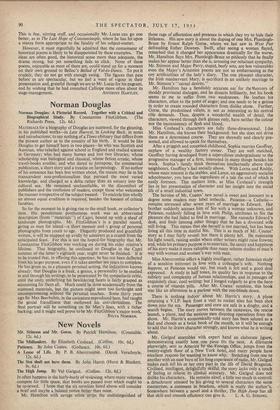New Novels
The High Jump. By Val Gielgud. (Collins. 12s. 6d.) IT often happens in the hurly-burly of reviewing, where many volumes compete for little space, that books are passed over which ought to be reviewed. I hope that the six novelists listed above will consider a brief and maybe a belated notice better than none.
Mr. Hamilton with savage relish strips the undistinguished of those rags of affectation and pretence in which they try to hide their littleness. His new story is about the duping of one Mrs. Plumleigh- Bruce by Ernest Ralph Gorse, whom we last saw in West Pier defrauding Esther Downes. Swift, after seeing a woman flayed, remarked that it changed her appearance drastically for the worse. Mr. Hamilton flays Mrs. Plumleigh-Bruce so pitilessly that he finally makes her appear better than she is, arousing our reluctant sympathy. Mr. Stimson and Major Parry, stupid, beefy sots, are less vulnerable: even the Major's Armistice poems are not so embarrassing as the coy artificialities of the lady's diary. The one pleasant character, the Irish maidservant Mary, is sacrificed in an unlikely marriage to Mr. Stimson's "carnal desires."
Mr. Hamilton has a fiendishly accurate ear for the ihorrors of shoddy provincial dialogue, and he dissects brilliantly, but his book seems to me to suffer from two weaknesses. He loathes his characters, often to the point of anger; and one needs to be a genius in order to create rounded characters from dislike alone. Further, Gorse, the predestined villain, is not as interesting as his central role demands. Thus, despite a wonderful wealth of detail, the characters, viewed through dark glasses only, have neither the colour nor the inconsistency of flesh and blood.
Miss Coxhead's characters are fully three-dimensional. Like Mr. Hamilton, she 'knows their background: but she does not drive them on a determined course. They are shrewdly and clearly pre- sented, and allowed to speak for themselves. After a priggish and conceited childhood, Sophia marries Geoffrey, nephew of a wealthy factory owner. They are well matched, Geoffrey having developed from a supercilious undergraduate to the progressive manager of a firm, interested in many things besides his work. Sophia's family think themselves intellectually above their neighbours, Geoffrey's feel socially above. With Lorna and Roddy, whose main interest is the stables, and Lance, an aggressively socialist schoolmaster, you have the ingredients of a tale the end of which is easily foreseen. This matters little, as Miss Coxhead's strength lies in her presentation of character and her insight into the social life of a small industrial town.
The heroine of Mr. Coates' new novel is sweet and innocent to a degree some readers may label imbecile. Patience—a Catholic— remains unroused after seven years of marriage to Edward. Her. brother suddenly accuses him of Sin with a woman unknown, and Patience, suddenly falling in love with Philip, attributes to Sin the pleasure she had failed to find in marriage. She ransacks Edward's desk, and finds (among other things) that he has a divorced wife still living. This means that she herself is not married, but has been living all this time in dutiful Sin. This is as much of Mr. Coates' story as I may fairly reveal: but there is plenty left. He maintains his light touch, raising smiles where other writers might raise frowns; and, while his primary purpose is to entertain, the sanity and happiness of his story make it more valuable than many solemn studies of man's way with woman and woman's way with man.
Miss Abercrombie offers a highly intelligent, rather Jamesian study of a sensitive introvert in love with a colleague's wife. Nothing happens, as Patience would say, but much is felt and a good deal expressed. A study in half tones, its quality lies in response to the subtlety and complexity of human relationships, and in passages of exquisitely clear, cool writing: but I longed vulgarly to give the hero a course of vitamin pills. After Mr. Coates' sunshine, this book was like an afternoon in a parlour with the sun-blinds down.
There is nothing indoor about Mr. Harris's story. A plane returning a V.I.P: back from a visit to rocket sites has been shot down into the sea. Passenger and crew are safe in a dinghy, and a search begins. The story moves between the castaways, the rescue launch, a plane, and the anxious men directing operations from the shore. Mr. Harris's economically-told story has been saluted as a find and chosen as a twice book of the month, so it will be enough to add that he draws character strongly, and knows what he is writing about.
Mr. Gielgud assembles with expert hand an elaborate jigsaw, demonstrating exactly how one piece fits the next. A dilettante playwright, sent to America by the Foreign Office, jumps from the twenty-eighth floor of a New York hotel, and many people have excellent reasons for wanting to know why. Switching from one to another with an ease born of his long experience of radio, Mr. Gielgud makes each tell his or her own part in the life of David Braganza. 'Civilised, intelligent, delightfully skilful, the story lacks only a touch of feeling to relieve its clinical accuracy. Mr. Gielgud does not dislike his characters. He remains aloof, a little too much in control: a detachment attested by his giving to several characters the same mannerism, a comment in brackets, which is really the author's. Somewhere between a novel and a thriller, The High Jump has all that skill and smooth efficiency can give it. L. A. G. STRONG.


























 Previous page
Previous page